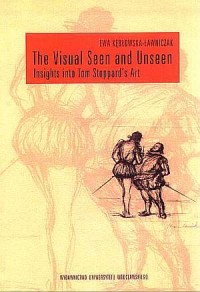The Visual Seen and Unseen. Insights into Tom Stoppards Art. Dramat - teatr 9
Ewa Kłębowska-Ławniczak

| Dane szczegółowe: | |
| Wydawca: | Wydawnictwo Uniwersytetu Wrocławskiego |
| Oprawa: | miękka |
| Ilość stron: | 318 s. |
| Wymiar: | 168x238 mm |
| EAN: | 9788322925256 |
| ISBN: | 83-229-2525-5 |
| ISSN: | 0239-6661 |
| Data: | 2001-01-13 |
Opis książki:
Vision, Visuality, and Image in Context; Vision, Visuality and the Verbal Bias; Liberation from Scenography and Movement towards a Variously Defined Event; Word and image Contract and the Concept of Theatre; Avant-garde Contributions to the Visual Project; Abti-illusionism; Against Autonomy; Against Language and the Logic of the Conscious; Reconstructing the Concept of the Modern Visual Field: Vision, Spectator and Object; Playing with Perspective(s) in the Early Plays; The Collapse of Perspective and the Fall of the Cartesian Subject in Alberts Bridge; Striving to Restore the Collapsed Perspective: Enter a Free Man; Anti-retinality and Multiperspectivism in Artist Descending a Staircase;Multiperspectivism and Labyrinthine Patterning in Travesties; Denigration of Vision in Rosencrantz and Guildenstern Are Dead: Legitimation Crisis and the Field of Desire; Legitimation According to Lyotard; Does Hamlet Provide a Legitimating Grand Narrative Hamlets Metanarrative and the Lyotardian petit récit; Lyotardian petit récit and the Stoppardian Predilection for Games; The Field of Desire; The Paranoid Eye and the Panoptic Eye and the Panoptic Eye of Surveillance; Generating Worlds in The Real Inspector Hound: From Epistemology to Ontology; Visuality According to Magritte: Resemblance and Similitude; The Panoptic Eye of Surveillance in Every Good Boy Deserves Favour; The Body and ther Hyperreal in the Theatrical Field of Vision: Jumpers; Influences; Triggering-off the Hyperreal; The Moon or the Cosmic Body; General Structure and Visual Complexity; Jumpers in the Moon; The Fantasy of Male and Female Bodies in the Field of Vision; The Circus Body and the Stripper; Body and New technologies of Vision: Corpse, Robot, Mannequin and Skin; Philosophical Coda; Visualizing Auto/Biography in the Intercultural Imperial Discourses of Indian Ink and in The Invention of Love; The Travelling Spectator/Seer in Indian Ink: Seeing and Being Seen as Travelling Spectator and Object of Biographical Account; The Painters First Contract; The Second Contract; Dissolution of Collectingness; Auto/Biography and Monument in The Invention of Love; Seeing and Reading: The Loss of Prospects and the Privilege of Shortsightedness in Arcadia; Conclusion; Appendix 1: "The Arab" by Charles stuart Caverley; Appendix 2: "The Elephant in the Moon" by Samuel Butler; Works Cited; Tom Stoppard: Playtexts; Interviews; Articles; Critical Approaches, Theory and History; Visuality; Other Sources; Electronic/Internet Sources; Coda:Wizualność widzialna I niewidzialna. Studium sztuki dramatycznej Toma Stopparda
Książka "The Visual Seen and Unseen. Insights into Tom Stoppards Art. Dramat - teatr 9" - Ewa Kłębowska-Ławniczak - oprawa miękka - Wydawnictwo Uniwersytetu Wrocławskiego.

